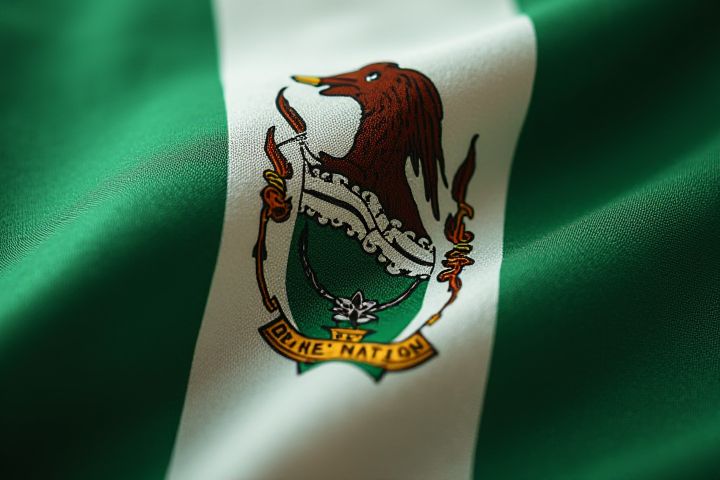
Nigeria, a country located in West Africa, is often referred to as a diverse nation due to its numerous ethnic groups, languages, and cultures. With over 250 ethnic groups, including the Hausa, Yoruba, and Igbo, Nigeria showcases a rich tapestry of traditions and customs. The nation operates a federal system, dividing government responsibilities among states to accommodate its varied demographics. While the concept of a unified nation persists, challenges such as ethnic tensions and religious differences sometimes strain national cohesion. Understanding Nigeria's complexity is essential for grasping its social dynamics and the ongoing efforts toward national unity.
Diverse ethnic groups
Nigeria is a multi-ethnic nation comprising over 250 distinct ethnic groups, with the three largest being the Hausa-Fulani, Yoruba, and Igbo. Each group possesses its own unique cultural practices, languages, and traditions, contributing to Nigeria's rich tapestry of diversity. This ethnic variation fosters a vibrant cultural scene, from festivals and art to music and cuisine, making Nigeria a melting pot of traditions and beliefs. Engaging with and understanding these diverse communities is essential for fostering national unity and appreciation for the nation's inherent multiculturalism.
Federal republic structure
Nigeria operates as a federal republic, which means it consists of multiple semi-autonomous states unified under a central government. This federal structure is characterized by power-sharing between the national and state governments, allowing for regional governance while maintaining national cohesion. The 36 states are complemented by the Federal Capital Territory, where the capital, Abuja, is located. This system aims to accommodate Nigeria's diverse ethnic groups and regional interests, promoting unity amidst plurality.
Multiple languages
Nigeria is a vibrant nation characterized by its rich tapestry of over 500 distinct languages, reflecting its diverse ethnic groups. The three major languages--Hausa, Yoruba, and Igbo--are widely spoken and serve as a means of cultural identity and communication among millions. Beyond these, nearly 400 indigenous languages contribute to the nation's linguistic landscape, promoting local traditions and fostering community ties. This multilingualism plays a crucial role in Nigeria's social fabric, influencing education, media, and day-to-day interactions.
Cultural richness
Nigeria, often regarded as a tapestry of cultures, encompasses over 250 ethnic groups, each contributing uniquely to the country's vibrant heritage. The Yoruba, Igbo, and Hausa tribes are among the largest, showcasing distinct languages, traditions, and art forms that reflect their diverse histories. Festivals such as the Durbar Festival and the Osun-Osogbo Festival celebrate this cultural richness, attracting both locals and tourists, while promoting unity and understanding among various communities. You can discover Nigeria's culinary diversity through its dishes, such as jollof rice and egusi soup, which epitomize its rich agricultural practices and regional flavors.
Historical amalgamation
Nigeria's historical amalgamation in 1914 brought together diverse ethnic groups, cultures, and languages under British colonial rule, creating a unique socio-political landscape. This unification aimed to streamline administration but often overlooked the deep-seated regional and ethnic differences, leading to ongoing tensions. The consequences of this amalgamation are evident in Nigeria's complex identity crisis, characterized by insurgencies and calls for autonomy from various groups. Understanding this historical context is crucial for grasping the challenges Nigeria faces in its pursuit of national unity and stability.
Colonial legacy
Nigeria's identity as a nation is deeply rooted in its colonial legacy, which shaped political boundaries and ethnic divisions. The amalgamation of diverse ethnic groups by British colonial powers in 1914 created a complex socio-political landscape, leading to ongoing tensions and conflicts. This historical context affects contemporary governance, as societal fragmentation often challenges national unity and stability. You can observe how the colonial past influences current issues such as resource allocation, regional disparities, and inter-ethnic relations within Nigeria.
Political unity challenges
Nigeria's political landscape is marked by significant challenges to national unity, primarily driven by ethnic diversity, religion, and regional disparities. The country is home to over 250 ethnic groups, with major ones including the Hausa-Fulani, Yoruba, and Igbo, each possessing distinct cultural identities and political interests. Tensions often arise from historical grievances, competition for resources, and perceived marginalization, hampering collaborative governance and fostering separatist sentiments. Addressing these challenges requires a concerted effort towards inclusive policies, equitable resource distribution, and fostering dialogue among Nigeria's diverse communities to strengthen national cohesion.
Economic disparities
Nigeria, often referred to as a multi-ethnic society, grapples with significant economic disparities that affect its unity. The wealth distribution is skewed, with urban areas like Lagos and Abuja showcasing affluence, while rural regions continue to experience poverty and lack of infrastructure. This economic divide fosters regional tensions and hinders cohesive national development, alienating many citizens from the benefits of national progress. Addressing these disparities through equitable resource allocation and inclusive policies is crucial for fostering true national unity in Nigeria.
Religious diversity
Nigeria's religious diversity is a defining characteristic of its cultural landscape, with approximately 50% of the population identifying as Muslim, predominantly in the northern regions, and around 40% as Christian, primarily in the southern areas. This religious pluralism fosters a rich tapestry of traditions, festivals, and beliefs that influence daily life, governance, and social interactions. However, it can also lead to tensions and conflicts, particularly in regions where religious boundaries overlap with ethnic and political affiliations. Understanding Nigeria's unique religious dynamics is essential for promoting unity and fostering peaceful coexistence among its diverse communities.
Nationwide identity efforts
Nigeria's nationwide identity efforts aim to foster unity among its diverse ethnic groups, promoting a collective national identity that transcends regional differences. The government's initiative includes the National Identity Management Commission (NIMC), which works to issue unique identification numbers to citizens, enhancing access to services and strengthening social cohesion. Engaging citizens through various cultural programs and national events further encourages the embrace of a shared heritage, emphasizing common values and aspirations. These efforts are crucial for building trust and collaboration across Nigeria's multifaceted society, ultimately enhancing national stability.
